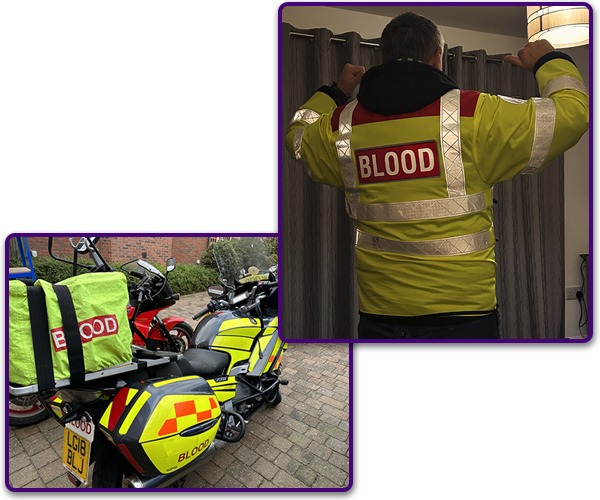Penney Berryman from Planet Mainframe connected with Mark for a few minutes between his work in the UK and his hobby of restoring motorcycles.
Mark Wilson’s energy and easy laugh infuse the conversation in person or on the phone. He throws his head back and guffaws, warming the room and making you want to lean in. Nominations for Mark frequently mentioned “boundless energy,” “tireless effort,” and the ability to make even dry topics “amusing.”
Another defining characteristic of Wilson is humility. Mark is sincerely a self-deprecating guy. His modesty is part of a reputation that precedes him. Wilson laughingly replied when asked his thoughts on his influential mainframer nomination, “I don’t know why! I don’t do anything different than others.” After a brief pause and a wry smile, he added, “Well, I am pretty lively and loud. People tend to push me up front.”
Even as a child, Wilson frequently found himself at the front. He knew what to do and how to get it done. His parents jokingly called him a “bossy little bit” and declared that his future would include leadership. They were right. That loud, lively leader is a significant player in ensuring the next generation of skilled mainframers.
An Evolving Career in Mainframe
Mark Wilson unexpectedly joined the land of mainframes at age 16, turning a three-month opportunity into a 44-year career (so far!). His original plan to join the Navy for electronic engineering shifted when a mentor noted Mark’s aptitude and suggested a different career path.
In his early career, Mark worked as a systems programmer and devoted virtually all his time to work. He quickly found success in providing mainframe consulting services. A downturn in the early 2000s gave Wilson a new perspective.
In 2006, he launched RSM Partners, providing mainframe services to organizations worldwide. His business acumen and engaging personality led the successful business for almost 10 years before he sold RSM to a major software vendor. Mark stayed on to run their professional services team for almost three years before launching a new business venture.
Wilson established Vertali with four others in 2023. In short order, Vertali grew from a team of five to nearly 40, with revenues approaching £4.5 million.
Giving Back to Grow the Community
Mark values giving back to the mainframe community and has developed initiatives at each of his companies to attract new technical mainframe talent. “You have to give to get,” Mark shares, referring to his philosophy that mentorship can help safeguard the platform’s future.
It’s no secret that replacing a retiring workforce of mainframe experts is one of the field’s biggest challenges. But nothing spurs Mark on more than a difficult task.
“We’ve got to get students interested in enterprise computing sooner.”
His ultimate goal is to bring high school students into the mainframe fold. “We’ve got to get students interested in enterprise computing sooner,” Wilson says seriously. “College is really too late. They need to develop the discipline that’s needed with mainframes. They need to grasp the formality of it, the necessity of redundancy.”
Plus—he adds, with his educator cap still on—“We need to teach the nontechnical stuff too – how to communicate, give a presentation, write a report, and deal with difficult colleagues and clients.”
Mark’s approach seems to be working. One of his nominators, Dougie Lawson, wrote, “Mark is the single most influential person in my MVS / z/OS career.”
Leading Guide Share Europe (GSE)
Mark also channels his tenacious spirit into Guide Share Europe (GSE), an international non-profit association of companies, organizations, and individuals involved in technology using mainframe architectures. Wilson is the GSE UK Region Manager and GSE UK Conference Manager. He pridefully notes that the group is 100% independent, led, and staffed by dedicated volunteers.
Under his leadership and with a great team, the annual GSE UK conference grew from around 150 attendees and five vendors to nearly 650 attendees and 35 vendors. He also focused on attracting new computer scientists and engineers in college, successfully lowering the average age of GSE conference attendees by nearly 10 years during his tenure.
Wilson attributes his success to a simple formula: “I rarely say no and always volunteer to lead and teach technology.” His encyclopedic knowledge of mainframe technology is the envy of many.
Elevating security challenges
Reflecting on changes during his multi-decade career, Wilson is most amazed by the connectivity and openness gained with APIs. Gone are the days when a team knew every person and mainframe connection point within a tightly controlled, closed operation.
“Now,” Mark added, “we’ve got TCP/IP, ports, and APIs everywhere! But the downside is businesses have no clue who is connecting.”
True or False: The mainframe is impenetrable. False. The first publicly documented mainframe hack occurred in 2012 with Sweden’s Nordea Bank.
In the last 15 years, this mainframe connectivity transition has driven crucial conversations around hacking, security, and vulnerabilities.
Known as “the mainframe security guy” in many circles, people routinely ask Mark if the mainframe is secure. His patent reply: “It’s securable. But it takes effort, training, software, and people.”
He points to Sweden’s Nordea Bank/Logica as the first documented mainframe hack in 2012. According to Mark, the case is unique because it was a remote hack by someone self-taught. It was the spark that ignited the mainframe security awareness fire.
“[The mainframe] is securable. But it takes effort, training, software, and people.”
The role of AI in enterprise computing
Considering how artificial intelligence (AI) will interface with mainframes, Mark considers security first. This isn’t surprising, as Ciara O’Connor, Technical Architect at Vertali, noted in her nomination, “Mark Wilson is known worldwide for his expertise in practical mainframe penetration testing and cyber security of mainframe systems.”
Wilson’s three predictions for AI use on the mainframe include:
1. Fraud detection. Embedding AI onto the actual processor of the latest mainframe servers enables businesses to conduct fraud risk at incredible speeds. Pre-z16, businesses made risk-based decisions on which transactions to review based on capacity limitations.
“Now, every business with a mainframe can inference-check every single transaction by testing them with AI,” Wilson says excitedly. “This is one of the biggest benefits to businesses and their security teams.”
2. Behavioral analytics. With AI, companies can track and create system logs for each client’s daily activities. If a completely different activity pattern appears, AI can slow or temporarily halt work. Being able to pause, alert, or stop in real-time is a critical step in using AI tools to protect businesses.
“I look at AI from a security perspective.”
3. Observability. Many mainframe systems act as the hub for enterprise IT for organizations that are interwoven with many other applications or services. When an application has a problem, companies need technology to understand all the complexity involved. They need the ability to access, analyze, and act on insights from every element of your hybrid IT environment – including mainframes.
Is there a downside to hurtling toward AI with F1 speeds? No, according to Wilson, there are two.
The first is that, like any computer, AI will only do what we tell or teach it. You’ll receive a strange or incorrect response if you ask the question incorrectly or unclearly. This is especially true of the “free AI stuff,” Wilson said with a snort. “You can’t really rely on it.”
The other AI limitation that Mark sees applies globally. “AI speeds up the process, but it’s only a starting point.” Wilson admits uncertainty around whether AI will replace jobs, and also a concern that AI may prevent jobs from being created in the future.
His AI crystal ball predictions for the mainframe: “Expect to see a lot of change.”
Better. Faster. Stronger: Motorcycles & Mainframes
Wilson’s professional accolades aside, he’s equally accomplished in his personal life: father of three daughters, grandfather (with another on the way!), business owner, and motorcycle enthusiast who rebuilds and restores motorcycles. Mark uses the latter to benefit his community with Blood Bikes.
The Nationwide Association of Blood Bikes is a force of specially trained volunteers who support the medical industry. Running 24 hours a day, every day of the year, volunteers receive notifications of medical needs via an app. Like other volunteers, Mark receives a ping that a resource needs to move from one facility to another. He and other volunteers take off to pick up a whole manner of items: chemotherapy drugs, breastmilk, specific medications, and certain blood types, darting through traffic to make urgent deliveries.
“Volunteering with Blood Bikes is the thing I’m most proud of. It’s what I enjoy doing most in my day.”

Whether it’s educating future computer engineers, leading his company into new markets, planning security strategies, solving a challenge to build a smaller engine with more speed, or delivering life-saving medications, Mark Wilson has his finger on the pulse of people and technology. That’s why he continues to be a mainframe influencer.
Penney Berryman, MPH (she/her), is the Content Editor for Planet Mainframe. She also writes health technology and online education marketing materials. Penney is based in Austin, Texas.
Connect with her on LinkedIn.



